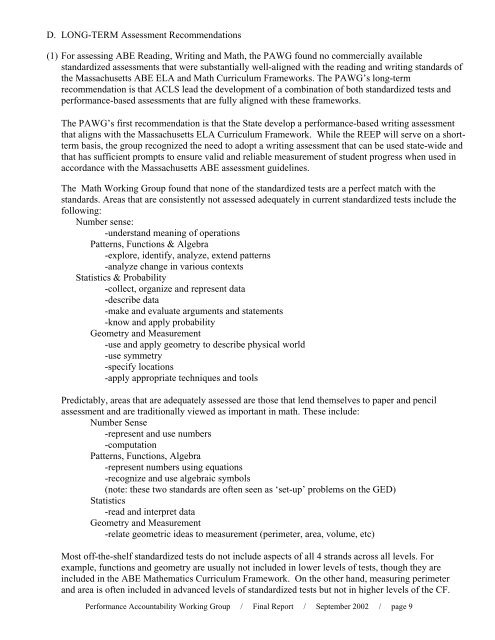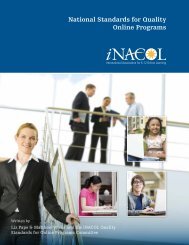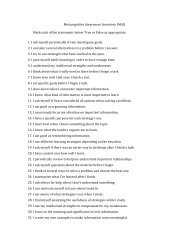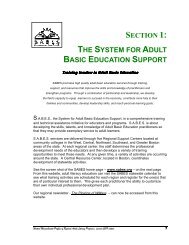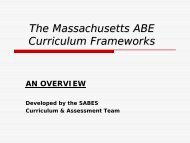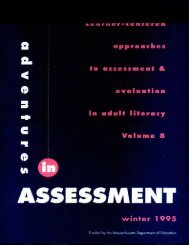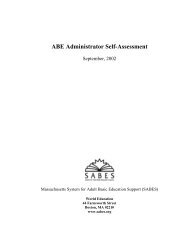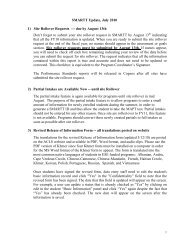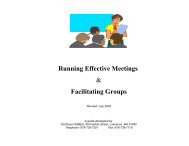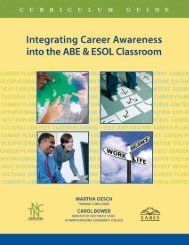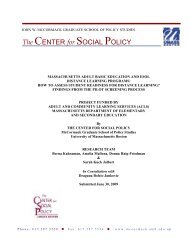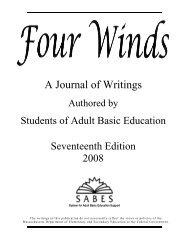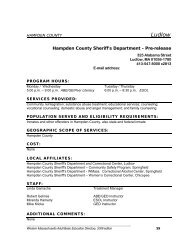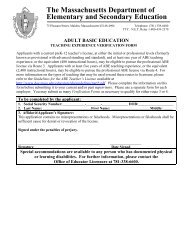PAWG I Final Report - SABES
PAWG I Final Report - SABES
PAWG I Final Report - SABES
Create successful ePaper yourself
Turn your PDF publications into a flip-book with our unique Google optimized e-Paper software.
D. LONG-TERM Assessment Recommendations<br />
(1) For assessing ABE Reading, Writing and Math, the <strong>PAWG</strong> found no commercially available<br />
standardized assessments that were substantially well-aligned with the reading and writing standards of<br />
the Massachusetts ABE ELA and Math Curriculum Frameworks. The <strong>PAWG</strong>’s long-term<br />
recommendation is that ACLS lead the development of a combination of both standardized tests and<br />
performance-based assessments that are fully aligned with these frameworks.<br />
The <strong>PAWG</strong>’s first recommendation is that the State develop a performance-based writing assessment<br />
that aligns with the Massachusetts ELA Curriculum Framework. While the REEP will serve on a shortterm<br />
basis, the group recognized the need to adopt a writing assessment that can be used state-wide and<br />
that has sufficient prompts to ensure valid and reliable measurement of student progress when used in<br />
accordance with the Massachusetts ABE assessment guidelines.<br />
The Math Working Group found that none of the standardized tests are a perfect match with the<br />
standards. Areas that are consistently not assessed adequately in current standardized tests include the<br />
following:<br />
Number sense:<br />
-understand meaning of operations<br />
Patterns, Functions & Algebra<br />
-explore, identify, analyze, extend patterns<br />
-analyze change in various contexts<br />
Statistics & Probability<br />
-collect, organize and represent data<br />
-describe data<br />
-make and evaluate arguments and statements<br />
-know and apply probability<br />
Geometry and Measurement<br />
-use and apply geometry to describe physical world<br />
-use symmetry<br />
-specify locations<br />
-apply appropriate techniques and tools<br />
Predictably, areas that are adequately assessed are those that lend themselves to paper and pencil<br />
assessment and are traditionally viewed as important in math. These include:<br />
Number Sense<br />
-represent and use numbers<br />
-computation<br />
Patterns, Functions, Algebra<br />
-represent numbers using equations<br />
-recognize and use algebraic symbols<br />
(note: these two standards are often seen as ‘set-up’ problems on the GED)<br />
Statistics<br />
-read and interpret data<br />
Geometry and Measurement<br />
-relate geometric ideas to measurement (perimeter, area, volume, etc)<br />
Most off-the-shelf standardized tests do not include aspects of all 4 strands across all levels. For<br />
example, functions and geometry are usually not included in lower levels of tests, though they are<br />
included in the ABE Mathematics Curriculum Framework. On the other hand, measuring perimeter<br />
and area is often included in advanced levels of standardized tests but not in higher levels of the CF.<br />
Performance Accountability Working Group / <strong>Final</strong> <strong>Report</strong> / September 2002 / page 9


